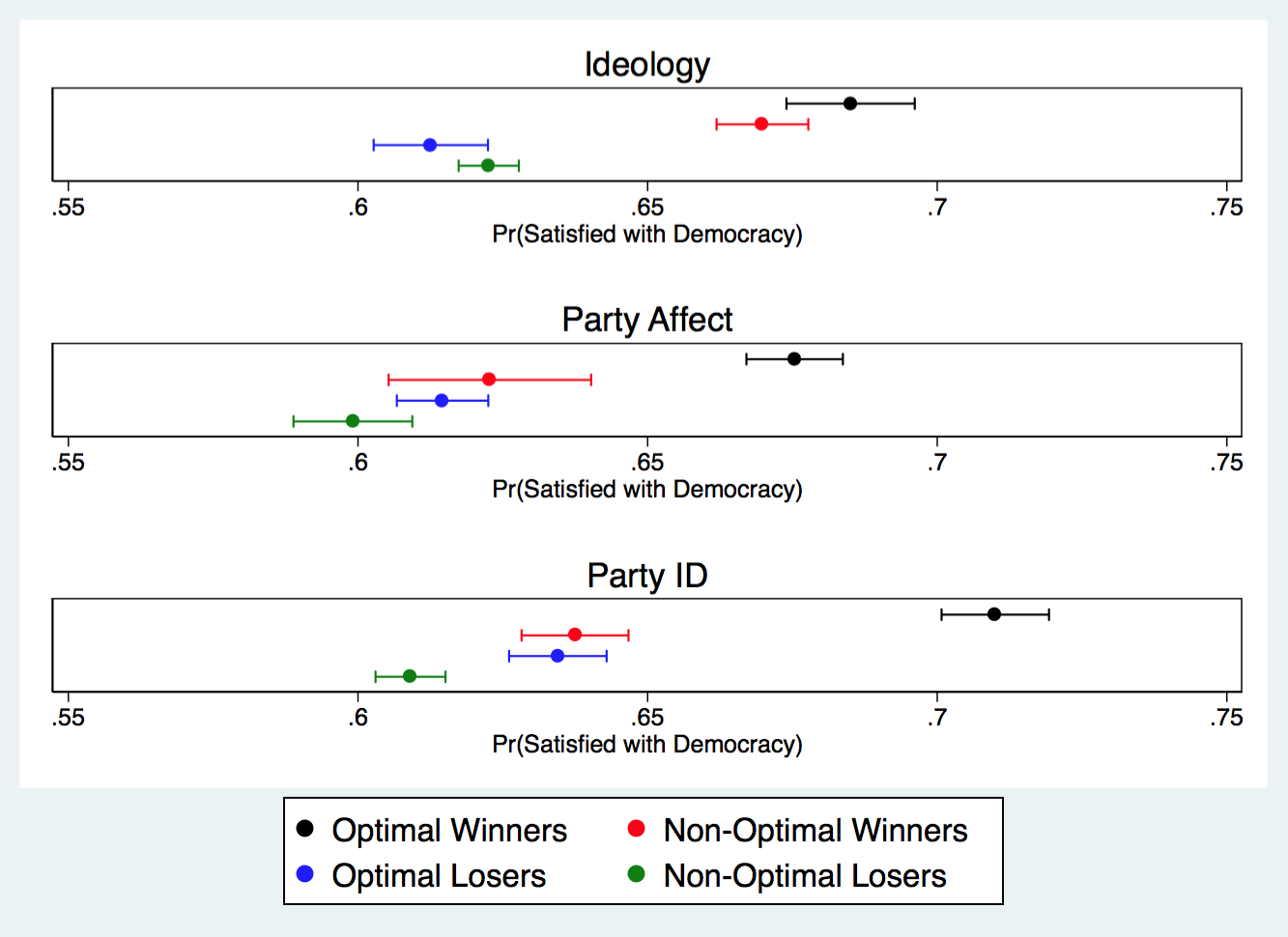Voting for the winning party makes people happier with democracy, especially if the winning party is highly preferred
It is well established that voters are more likely to think highly of their political systems when they produce the outcomes that they wish to see, but what of those voters who, for a number of reasons, do not vote for their favoured party? Shane Singh shows that these voters are less likely to share in this satisfaction, owing to a number of factors including the policies and political outcomes that may result from the victory of a less favoured party.

The London Mayoral election saw many voters support an unfavoured candidate due to a paucity of options elsewhere. (Credit: Matt Brown, CC BY SA ND 2.0)
Whether in sports, gambling, or politics, people like to win. In elections in particular, voting for the winning party increases one’s satisfaction with democracy. There are at least two reasons for this. Psychologically, winning engenders a range of positive emotions, and these can translate into increased approval of the democratic process. Politically, the victorious party usually has several years to advance its preferred policies, which can also increase satisfaction among that party’s voters. To this end, dozens of studies demonstrate the positive relationship between satisfaction with democracy and voting for the winning party.
Yet many people do not vote for their most preferred party, and, as I show in an article published in the European Journal of Political Research, the positive effects of winning attenuate among such voters. Voting for the victorious party is less likely to increase satisfaction for those who abandoned their preferred party because the benefits of winning will dissipate. First, instead of experiencing positive emotions, such winners might feel “buyer’s remorse,” or even a sense of defeat associated with helping to elect a non-favored party. Second, a winning voter’s preferred policies are less likely to be advanced with the victory of a non-favored party. To use a sports analogy, if one’s most preferred football team achieves a major victory, he or she will be quite a bit happier as compared to before the match started, while a victory for a less preferred side will do relatively little to increase his or her contentment.
Why might one abandon a favored party? Some will choose a less-preferred option because of disenchantment due to a scandal, or one might find a particular candidate extremely distasteful and therefore select a less favored party. Strategic behavior can also lead voters to stray from preferred parties. For example, in electoral systems that punish small parties, minor party supporters might tactically select a candidate with a realistic chance of winning in order to avoid the election of a most-disliked candidate. Or, in countries with a strong tradition of coalition government, voters might strategically select a less liked party in hopes of pulling of the resulting administration in a particular ideological direction.
I gathered election returns and survey data across dozens of democratic countries to analyze the relationship between winning and satisfaction among those who voted for their preferred parties and those who did not. I considered three types of voter preferences relative to the competing parties: the extent to which the party one voted for aligned with his or her reported left-right political ideology, the extent to which the party one voted for matched his or her reported affect for that party, and whether or not the party one voted for matched his or her reported party identification.
The results of my analyses are summarized in the figure. Each circle represents the probability that a given voter is satisfied with democracy. (The horizontal bars represent 95% confidence intervals.) Starting with the top panel of the figure, it is clear that the most satisfied voters are those who not only selected the winning party, but also selected the ideologically nearest party, thus voting “optimally”. Those who selected a winning party that was not ideologically nearest are less likely to be satisfied with democracy, while those who selecting a losing party are much less likely to be satisfied.
This pattern is much starker when party affect and party identification are considered. As evident in the bottom two panels of the figure, for winners who abandoned the party they liked most or the party they identified with, predicted satisfaction levels are similar to those of electoral losers—those who voted against the winning party. Alternatively, winners who voted for their most liked party or the party they identified with are more likely to be satisfied with democracy than anyone else. Winning engenders satisfaction with democracy for those who voted “optimally”. For those who selected a party that was less than optimal, winning does relatively little to boost satisfaction.
These findings have important implications for the United Kingdom, in particular. Because many constituencies are uncompetitive or are competitive for only two parties, voters will often find it sensible to abandon their preferred party in favour of a less preferred party with a realistic chance of winning. That is, many winners in the UK are likely to have voted against their “optimal” party. This means the positive effect of victory on satisfaction could frequently elude winners in the UK. Still, for those who did vote for an “optimal” winning party, the effects of winning on satisfaction might be especially pronounced. Setting aside the current administration, minority and coalition government is very uncommon in the UK.
As such, winning parties are less likely to share power with another party, and electoral victories tend to be conclusive—and thus especially salient for voters who selected the winning party. Further, once in power, the party in government will have a relatively easy time advancing its agenda, meaning, relative to other democracies, an “optimal” winner’s preferred policies are quite likely to pass through parliament in the UK. Individuals in the United Kingdom who not only voted for the winner, but also voted for a highly favoured party, have reason to be quite satisfied with the democratic system.
—
Note: This post represents the views of the author and not those of Democratic Audit or the LSE. Please read our comments policy before posting. The shortened URL for this post is: https://buff.ly/1hovdrx
—
 Shane Singh is an assistant professor in the School of Public and International Affairs at the University of Georgia. The full results of his article are available to read in the European Journal of Political Research. His website is here.
Shane Singh is an assistant professor in the School of Public and International Affairs at the University of Georgia. The full results of his article are available to read in the European Journal of Political Research. His website is here.






 Democratic Audit's core funding is provided by the Joseph Rowntree Charitable Trust. Additional funding is provided by the London School of Economics.
Democratic Audit's core funding is provided by the Joseph Rowntree Charitable Trust. Additional funding is provided by the London School of Economics.
Jordan 6 Carmine
https://code.google.com/p/jordan-11-low-concord-online/ https://code.google.com/p/jordan-11-low-concord-online/ [url=https://code.google.com/p/jordan-11-low-concord-online/]https://code.google.com/p/jordan-11-low-concord-online/[/url]
EASPORTS
Voting for the winning party makes people happier with democracy, especially if the winning party is highly preferred : Democratic Audit UK
RT @isabelsataylor: Voting for the winning party makes people happier with democracy, especially if the winning party is highly preferred h…
RT @democraticaudit: Voting for the winning party makes people happier with democracy, especially if the winning party is highly preferred …
Check out out this blog post about how voting for a winnning party you don’t like makes you feel https://t.co/RVhy2D18Xv
“Voting for winning party makes people happier with democracy” by Shane Singh @democraticaudit @UGA_INTL @UGA_SPIA https://t.co/TJ0N6avbXB
Voting for the winner makes you happy, voting for winner that isn’t your preference & effx attenuate: https://t.co/tJNqQYHi3r ht @PJDunleavy
RT @PJDunleavy: Voting for the winning party makes people happier with democracy, especially if the winning party is highly preferred http:…
RT @LSEPubAffairs: Voting for the winning party makes people happier with democracy, especially if the winning party is highly preferred ht…
Voting for the winning party makes people happier with democracy, especially if the winning party is highly preferred https://t.co/BYXxHB17yr
Voting for the winning party makes people happier with democracy, especially if the winning party is highly preferred
https://t.co/qxNDq0TYtw
Voting for the winning party makes people happier with democracy, especially if the winning party is… https://t.co/q8cCtO6Sfw